Hotel Asset Management: Best Practices and Importance
Are you struggling to manage your hotel properties? Learn how hotel asset management systems can take your hotel accommodation to the next level. Read inside.
In this article:
- What is Hotel Asset Management?
- Why is Hotel Asset Management Software Important?
- Maintaining the Hotel’s Physical Assets
- Optimizing Financial Performance
- Strategic Hotel Portfolio Management
- Enhancing the Guest Experience
- 5 Main Areas of Hotel Asset Management
- Revenue Management
- Investing in Capital Expenditure (CapEx)
- Improving Operational Efficiency
- Conducting Regular Audits and Reviews
- Managing Risks Proactively
- Best Practices for Hotel Asset Management
- Prioritize Regular Maintenance and Upgrades
- Use Data for Decision-Making
- Improve Inventory Management
- Use Strategic Capital Expenditure (CapEx) Planning
- Utilize Advanced Hospitality Asset Tracking Systems
- Improve Your Hotel Asset Management with Itefy
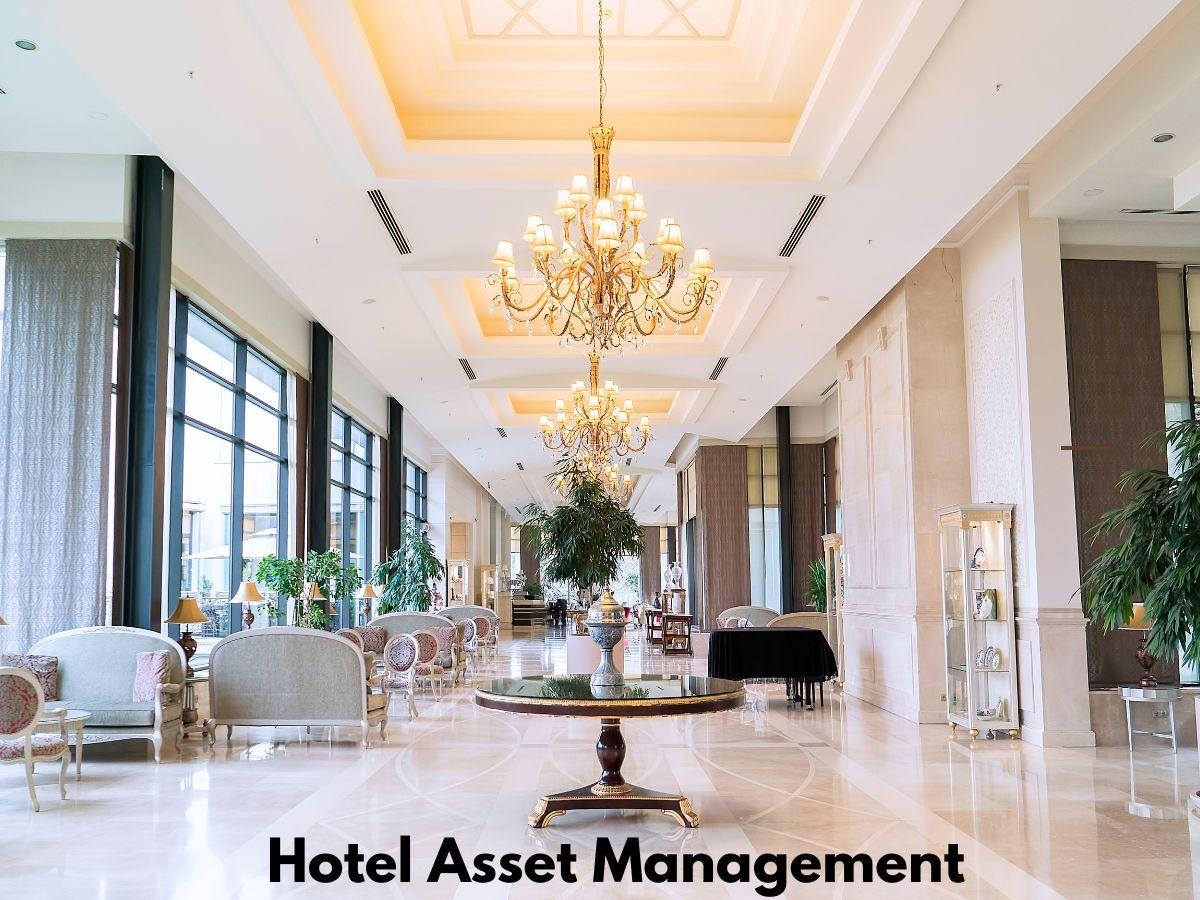
Have you ever wondered what keeps a hotel running smoothly, so the guests can have the most exceptional experience? It’s all due to a Hotel asset management system.
It is the process of overseeing and managing a hotel's assets, including its physical property, financial performance, and operational efficiency. It is done to ensure long-term profitability and value retention. By using effective asset management, you can maximize your return on investment (ROI) and extend the lifespan of your assets.
This article will explain everything in detail, starting from why it is important and which best practices you should be following as a hotel asset manager. Read ahead.
What is Hotel Asset Management?
Also known as hospitality asset management, it is a process of ensuring that a hotel’s assets are used in the best possible way. This includes managing the property itself, such as the building, equipment, and infrastructure, as well as overseeing the hotel’s financial operations.
The primary goal of asset management for hotels is to help hotel owners, and investors, get the most out of their investments while keeping the hotel running smoothly and providing great service to guests. Hotel Asset Management software like Itefy makes all of this possible.
By using this system, you can look at key performance indicators (KPIs) such as occupancy rates and revenue per room. You can also track trends in the market and compare the hotel’s performance to its competitors, making necessary changes and keeping the hotel running successfully.
Why is Hotel Asset Management Software Important?
Hotel asset management software is important because it helps hotel owners and investors get the most value for their properties.
Managing a hotel is more than just day-to-day operations. It involves long-term strategies to maintain the property, improve financial performance, and ensure a high level of guest satisfaction. This is where hotel asset management software plays an essential role.
A few reasons why this system has become extremely important for hotel owners nowadays are:
Maintaining the Hotel’s Physical Assets
One key reason why it is important is that it ensures the hotel's physical assets are maintained in the best way. This includes regular upkeep, renovations, and managing equipment to keep everything in top condition.
Without proper maintenance, hotels can face unexpected repairs, which can be costly and disrupt operations. According to HVS Global Hospitality Services, guestroom renovations range from $6,000 to $12,000 per room.
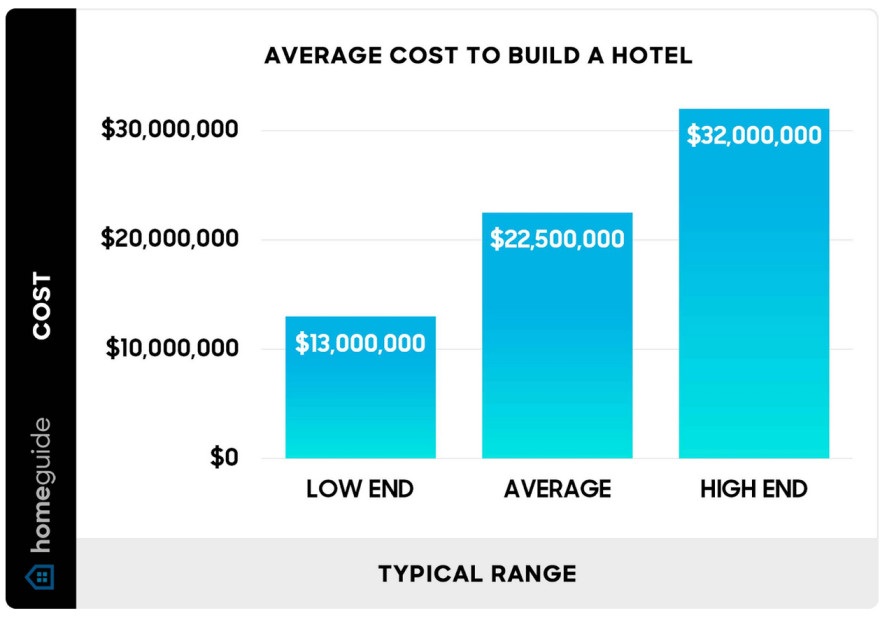
Bar charts showing the average cost of building a hotel
Source: HomeGuide
Optimizing Financial Performance
Asset hotel management also plays a significant role in further improving the hotel’s financial performance. Hotel owners can improve their revenue by setting budgets, controlling expenses, and identifying areas for growth.
As an asset manager, you should focus on key financial metrics like occupancy rates and revenue per available room (RevPAR) to track and improve the hotel’s performance.
Strategic Hotel Portfolio Management
For hotel owners with multiple properties, hotel portfolio management is essential. You need a strategic approach to manage and maximize the value of all your properties.
If you’re a manager, ensure that all the hotels are generating revenue and if you’re a hotel owner, then hire the best asset manager to keep everything in check.
Enhancing the Guest Experience
Lastly, hotel asset management is important for keeping the guests happy. When facilities are well-maintained, clean and run smoothly, guests have a more enjoyable stay. This leads to higher guest satisfaction, which in turn boosts customer loyalty and positive reviews, helping the business grow.
According to a recent study, 92% of travelers said that cleanliness is the most important factor that they consider while booking accommodation.
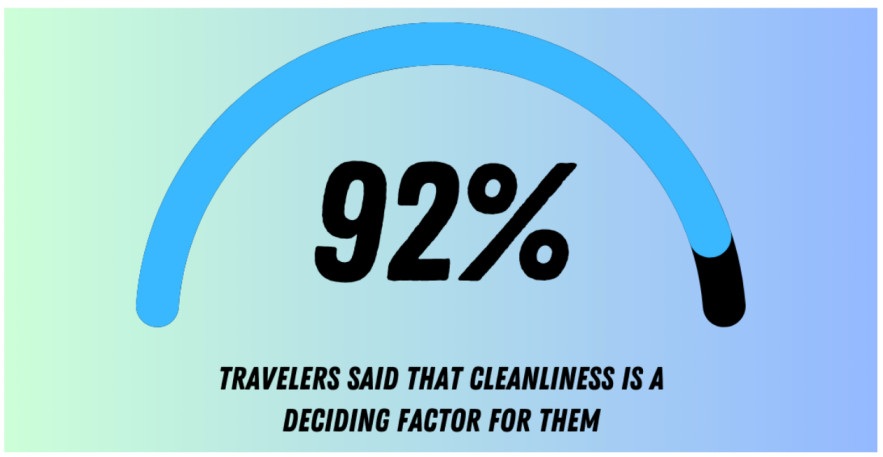
Percentage of travelers that say cleanliness is a deciding factor for accommodation
Source: LinkedIn
5 Main Areas of Hotel Asset Management
There are a total of 5 areas that can make or break a hotel. These include:
Revenue Management
Revenue management is a crucial part of managing the hotel’s assets in the best way. It uses data-driven insights to forecast customer demand, adjust pricing, and manage inventory. Through this, the hotels can maintain a balance between being fully booked and having rooms available, all while maximizing revenue.
By using the best revenue management strategies, your hotels can remain competitive without underpricing your services. However, it’s a complex process that requires analyzing large amounts of data and utilizing specialized tools.
Investing in Capital Expenditure (CapEx)
Every hotel requires periodic investment to maintain and improve its physical assets. This includes renovations, equipment upgrades, and investment in new technologies. Known as capital expenditure (CapEx), these investments ensure that the hotel remains competitive and continues to offer a high-quality experience for guests.
As hotel facilities age, physical assets deteriorate or become outdated. To stay ahead of the competition, you must invest in things like renovating rooms, upgrading HVAC systems, or adding new amenities like gyms or pools before they cause any issues. Making these investments strategically allows you to avoid costly repairs down the line.
Improving Operational Efficiency
If you want to improve your hotel’s operational efficiency, you need to use operational analysis. It ensures that the hotel is using the resources effectively and are on track to meet financial and operational goals.
This includes setting clear, measurable targets for the hotel’s performance and using data to track and improve efficiency. By analyzing hotel operations, asset managers can identify areas where costs can be reduced.
Conducting Regular Audits and Reviews
Consistent audits and reviews can help maintain effective hotel asset management. These evaluations ensure that all systems are functioning properly, and that hotel practices remain aligned with industry standards.
Regular maintenance checks help keep the property in top condition, and any asset lifecycle management tools must be updated regularly to remain efficient. It’s also important to provide regular training to your staff so they can make better decisions now.
Managing Risks Proactively
The last aspect of a hotel management system is risk management. It involves identifying, assessing, and mitigating risks that could harm the hotel’s operations or reputation. This process protects the hotel's assets and helps avoid unforeseen costs.
Hotels face many risks every day, such as financial challenges, shifts in consumer behavior, property damage and more. Cybersecurity threats are also a growing concern for hotels, as they store sensitive customer data online. However, by anticipating these risks, you can protect your reputation and avoid any unforeseen issues.
Best Practices for Hotel Asset Management
As an asset manager, you need to use a combination of strategies to make the hotel a success. Below are the key best practices for successful asset hotel management.
Prioritize Regular Maintenance and Upgrades
One of the most important aspects of asset management for hotels is maintaining the property and its facilities.
With regular maintenance, all your assets remain in top-notch condition. These assets include everything from routine inspections of HVAC systems to updating outdated furniture and technology. Through regular asset maintenance, you can avoid costly repairs and provide a smooth guest experience.
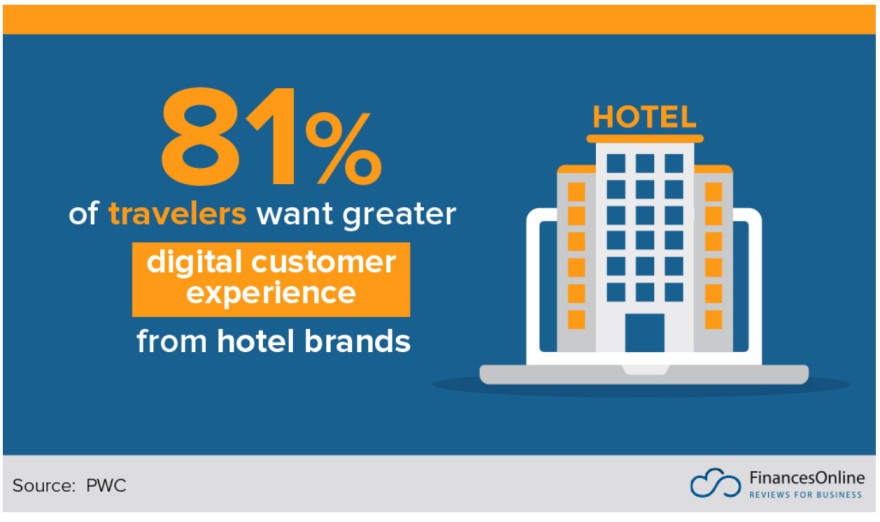
Percentage of travelers who want a greater digital customer experience
Source: FinancesOnline
Use Data for Decision-Making
Data plays a crucial role in hospitality asset management. Analyzing key performance indicators (KPIs) such as occupancy rates, revenue per available room (RevPAR), and operational costs allows asset managers to make informed decisions.
For this, you can use tools like hospitality asset tracking systems. They provide real-time data on the condition and usage of assets, which you can use to track performance and identify areas for improvement.
Studies indicate that hotels using data analytics for demand forecasting can see a 5-10% increase in revenue and a 15-20% decrease in operating costs.
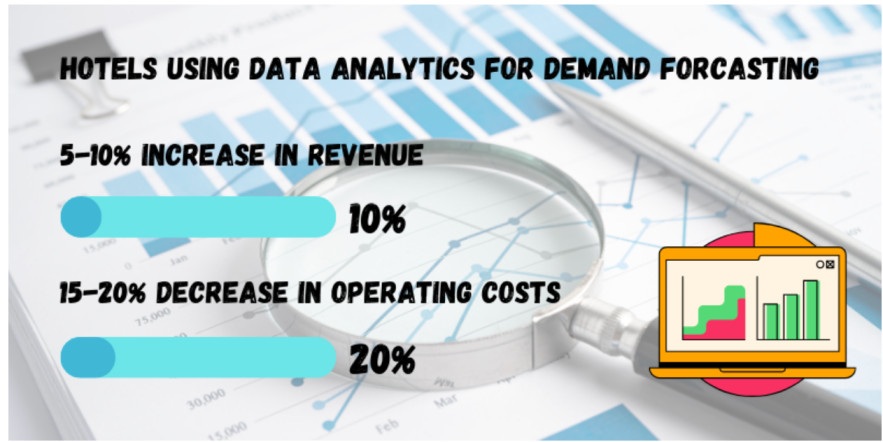
Positive impact of data analytics on hotels
Source: Atlan
Improve Inventory Management
Inventory management is another critical aspect of hotel asset management. Ensuring that the right amount of supplies, from linens to food and beverages, is available at all times is essential if you want your business to move smoothly. Just remember, over-ordering can lead to waste, while under-ordering can cause disruptions.
Use Strategic Capital Expenditure (CapEx) Planning
For effective hotel asset management, you need a well-planned CapEx strategy. You should invest in key areas such as renovations, new technology, and energy-efficient systems that can improve the guest experience and increase the hotel’s value.
This strategy ensures that these investments are made at the right time and within budget. By doing so, you can stay competitive without overspending.
Utilize Advanced Hospitality Asset Tracking Systems
Tracking and managing assets in real-time is crucial for maintaining control over the hotel’s operations. You can start by implementing an advanced asset tracking system, through which you can monitor everything from room availability to equipment maintenance schedules.
These systems streamline operations, improve efficiency, and ensure that assets are used in the best possible way.
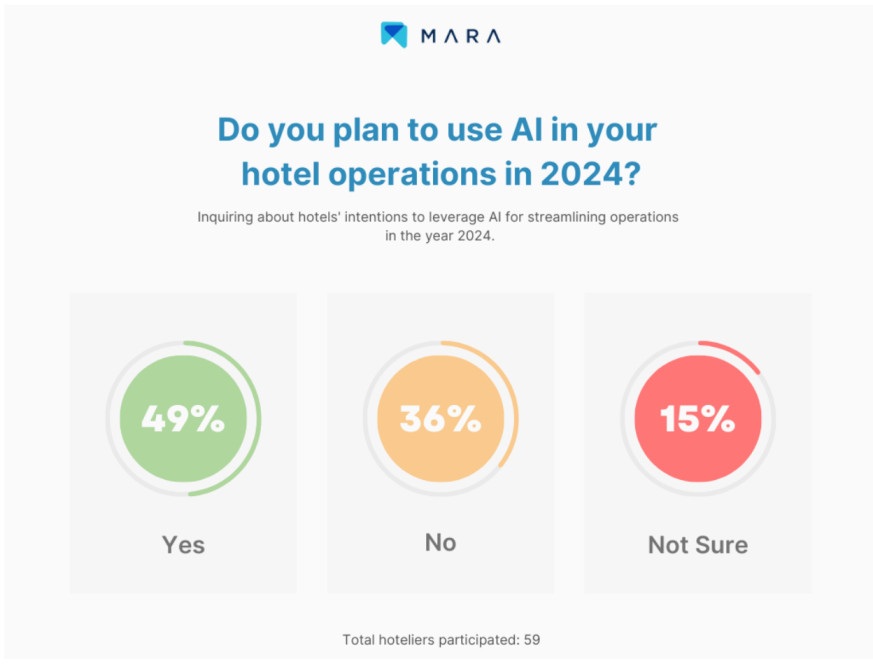
Percentage of hotels thinking of using AI in their operations
Source: MARA AI
Improve Your Hotel Asset Management with Itefy
Managing your hotel’s assets doesn’t have to be complicated. With Itefy, you can easily control everything from maintenance to tracking equipment in one place. Imagine how much easier it would be to keep everything running smoothly with real-time data and insights at your fingertips.
Whether you're planning for upgrades, reducing downtime, or ensuring your guests have the best experience, our Accommodation Property Management Software helps you stay on top of it all. So, start improving your hotel asset management today.
Frequently Asked Questions
-
Hotel asset management focuses on managing a hotel’s investment to achieve the owner's specific goals. The role of a hotel asset manager is to maximize the value of the property and the overall portfolio. It ensures long-term profitability and growth.
-
The three main asset management types are Physical Asset Management, which focuses on maintaining tangible assets, Financial Asset Management, which manages investments like stocks and bonds, and Digital Asset Management, which deals with organizing and maintaining digital content such as images, documents, and media files.
-
The hotel asset can be anything inside the hotel or even outside within a fixed perimeter. It could be a building, furniture, or equipment like HVAC systems or kitchen appliances. Anything bought for the hotel is considered an asset.
-
Hotel asset management fees typically range from 1% to 3% of the hotel's total revenue. It all depends on the services that are provided to the customer.
-
The three pillars of modern asset management are:
Asset Management Governance – Ensuring proper policies and oversight for managing assets.
Asset Lifecycle Management (LCM) – Managing assets from acquisition to disposal.
Discover, Audit, Reconcile (DAR) – Tracking assets, conducting audits, and resolving discrepancies.
